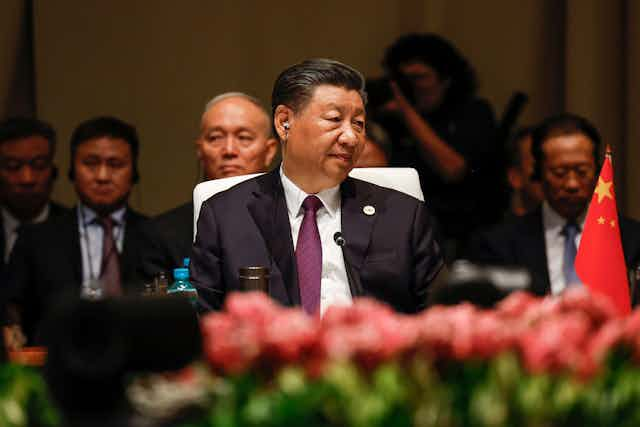As India prepares to host the G20 summit on September 9, there’s one person not readying his plane for the gathering of world leaders. China’s president Xi Jinping, who has attended every meeting of this summit since 2013, is not going.
Xi is busy dealing with significant economic problems at home, while also rejigging his foreign policy approach away from the aggressive “wolf warrior” diplomacy, a strategy he has pursued since 2017. He is now trying to position China as more of a global peacemaker and is testing out new ways of creating alliances with the west and in Asia.
The apparent abandonment of his previous wolf warrior policy, which typically had included shouting at foreign leaders and storming out of meetings, can be seen as a move away from the bellicose tone that characterised China-US relations and China’s wider relationship with the west in the mid to late 2010s.
It initially appeared that the abandonment of this approach, which took its name from the Chinese action series starring Wu Jing as a Chinese soldier battling western foes in Asia and Africa, could be attributed to changes in China’s foreign ministry in the summer of 2023.
Some of the most prominent “wolf warriors” were moved to posts outside foreign affairs. These include the former foreign ministry spokesperson, Zhao Lijian, being shifted to the department of boundaries and ocean affairs, or being dismissed altogether, most notably in the case of Qin Gang, who was removed from his post as foreign minister in unclear circumstances.
Both Qin and Zhao were well known for their fiery rhetoric from the days of the Sino-American trade war, which saw them spar with the equally belligerent administration of then US president Donald Trump. This period saw the dialogue between the US and China taking on a more coarse, hardline tone.
However, such a change has gone deeper than simply moving personnel around.
Another possible reason for the change in Chinese diplomacy has been Beijing’s efforts to deal with an increasingly difficult domestic economy, where youth unemployment is at a record high. It can also be seen as an effort to establish more partnerships internationally, rather than antagonise the entire western world.
The recent visit of UK foreign secretary James Cleverly to Beijing may have been indicative of China’s new softly softly approach.
Another example of this could be seen in Emmanuel Macron’s visit to China earlier in 2023, with the French president receiving a warm reception – far different from the previous era. Such a reception is also indicative of China’s preference to deal with individual states rather than international blocs as well as trying to ensure that the major European economies do not follow Washington’s lead on China. An aggressive diplomacy style could be counterproductive for these goals.
China the peacemaker?
The move away from wolf warrior diplomacy has also been part of a changing image that China has sought to promote in recent years. This has seen Beijing present itself as an international peacemaker, as illustrated by its mediation of the tensions between Iran and Saudi Arabia as well as Beijing’s proposed peace plan for the war in Ukraine.
Such an approach has appeared to give Beijing some diplomatic successes, which was illustrated by the Brics summit this year, where the bloc underwent the biggest expansion since its creation. As with China’s dealings with Europe, wolf warrior diplomacy here would again be contrary to Beijing’s aim of a new international image.

China’s move towards a new style of foreign policy has also echoed some changes in Washington. US rhetoric towards China during the Trump administration was as belligerent as the wolf warriors, which contributed to the crude nature of Sino-American interactions.
Since 2021 and the arrival of a new US president, this language has largely been dialled back and the more belligerent tone of the past has largely been confined to US domestic politics, where aspiring presidential candidates have competed over who is seen to be the toughest over China. This has also been mirrored in China, where nationalist rhetoric has primarily been the preserve of Chinese social media commentators, rather than the Chinese Communist Party.
While the rhetoric of the wolf warrior has been toned down on both sides, does this also change what both the west and China want to achieve?
The Biden administration, for instance, has continued many of the previous administration’s policies towards China. It could be argued that the abandonment of wolf warrior diplomacy is simply a cosmetic change, so far.
Is this a significant change?
Wolf warrior diplomacy has largely fallen out of fashion. But some of China’s core aims have been retained, but in a different form. This can be seen in the recent ban on imports of Japanese seafood.
Unlike previous Chinese diplomatic manoeuvres, Beijing has used environmental and safety concerns over the release of treated radioactive water from the Fukushima Daiichi nuclear power plant rather than relying on nationalist chest-thumping as it had done in the past. Such a message is likely to resonate with many in Asia, with several nations in the region imposing similar bans on Japanese produce.
In this way, it adds Asian allies and ramps up anti-Japanese feeling, as well as extending China’s diplomatic influence further.
While the wolf warriors are no longer as powerful as they once were, the objectives they sought to achieve may well remain the same.

